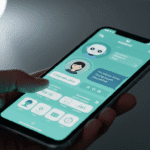Have you ever walked into a busy healthcare facility and not know where to go or what to do? This inconvenience may be a thing of the past with the help of beacon technology.
Have you ever walked into a busy healthcare facility and not know where to go or what to do? This inconvenience may be a thing of the past with the help of beacon technology.
![]() Beacons are a type of a low-cost, micro-location-based technology that uses Bluetooth low energy (BLE 4.0) for communicating with beacon-enabled devices. While the technology has shown success in retail, it also has a lot of potential in healthcare.
Beacons are a type of a low-cost, micro-location-based technology that uses Bluetooth low energy (BLE 4.0) for communicating with beacon-enabled devices. While the technology has shown success in retail, it also has a lot of potential in healthcare.
Beacons allow healthcare providers to be where their patients are, with the information they want, when they need it. A big change from the stereotype that health systems aren’t focused on the patient-centered care model but rather just their bottom lines.
Beacons allow health systems to meet the growing demand for personalized, predictive services by giving patients contextual, location-specific experiences.
Wouldn’t it be great to have a doctor greet a patient as soon as they walked into the facility? Or know where to go and what to do based off their insurance and scheduled appointment? With beacon technology a patient can be directed via their smartphone the moment they walk in the door.
In addition to improving patient visits, beacons can also allow hospitals to instantly gather contextual feedback throughout their visit and then use that data to help enhance future experiences.
This is just one of the many ways technology is improving patient experience in healthcare.







